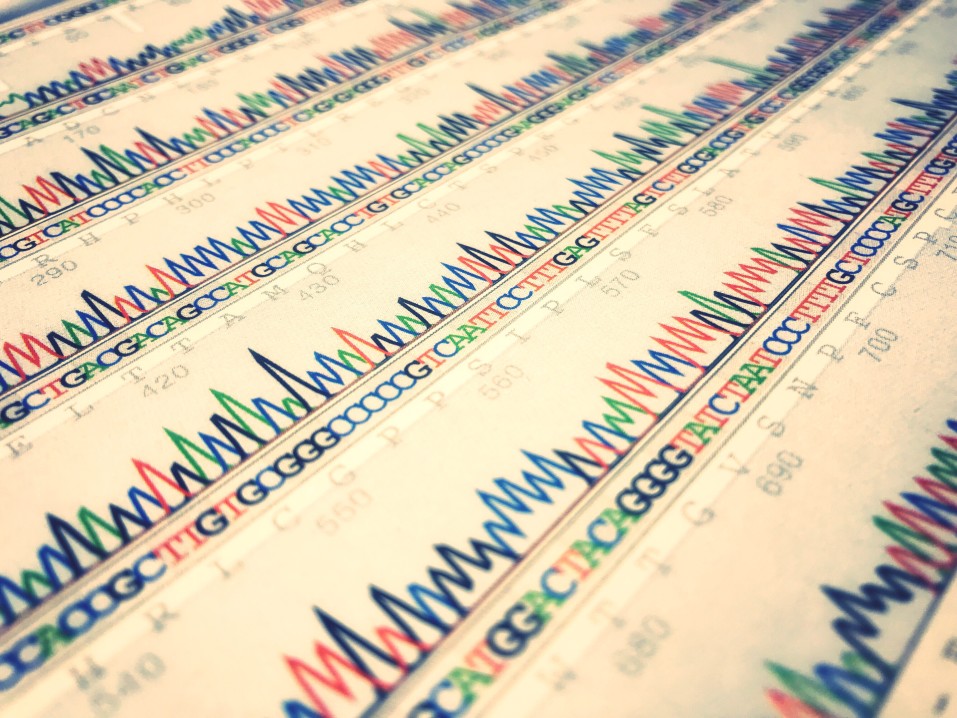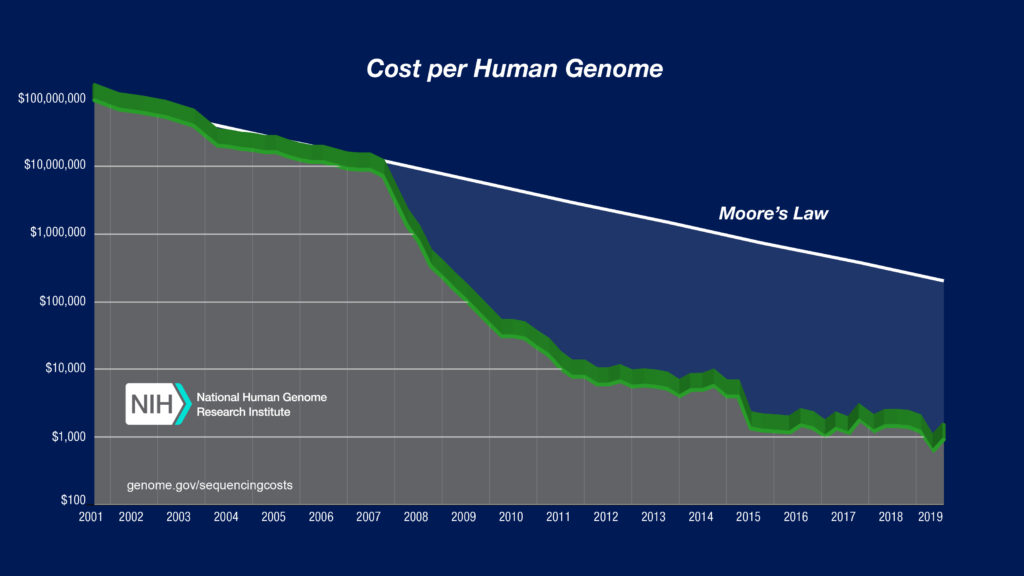Cost Reductions in Biotechnology
Over the years, we have watched with enthusiasm about how various technological improvements and automation are shaping everything we know about genomics. These technologies have helped to increase the speed and lower the costs of gene sequencing. Today, some labs can sequence an entire human genome for less than a thousand dollars. This milestone is incredible when you consider that this had cost roughly $10 million around 2008, according to the US National Institutes of Health.
National Human Genome Research Institute
Even more impressive is the new claim by Beijing Genomics Institute (BGI), a Chinese genetics giant, to offer $100 whole-genome sequencing very soon. This news may seem like a wild claim to most skeptics. Although the lowest price right now is six times higher than BGI’s $100 pursuit, this appears possible based on trends in gene sequencing in the past two decades.
How Gene Sequencing Works
About 3 billion base pairs of DNA make up the set of chromosomes of humans. It is more like a map of all the genes that make up the entire human body. To understand the sequence of these genes, they have to be snipped into smaller strands of DNA.
At the moment, DNA sequencing is done by pairing chemical DNA letters to the strands, along with a computer technology that then orders the fragment to map the full genome by synthesizing matching strands of genetic information. The computer is able to detect the order by which new letters are added, eventually helping it decode the sequence of the billions of DNA fragments. This data is then leveraged to map out the entire genome of an individual.
Beijing Genomics Institute is building on a technology initially acquired in the US, according to Technology Review. The process is still the same as the “sequencing by synthesis” approach of modern ultra-fast sequencing technology. The significant difference is that the new BGI’s approach incorporates a robotic arm along with imaging machines and a roomful of chemical baths.
The BGI system uses a vast, Frisbee-sized chip with its elements only 500 nanometers apart. The robotic arm dips the chip into the chemical baths, which is also reusable. Through this process, the sequencing can be done with twice as much DNA on the surface and with three times fewer reagents. The bulk of the $600 it currently costs for whole-genome sequencing is spent on chemicals. The new super-sequencer does not have a price tag as BGI plans to customize the system for great genetics and cancer research centers.
Implications of Affordable Genome Sequencing
Your genome, composed of over 3 billion letters of code, is contained in every single cell in your body. It is your biological blueprint, and a definition of who you are—sequencing the human genome yields about 200GB of information. By reading every letter of DNA present in our cells via whole-genome sequencing, we can significantly improve and personalize our approach to medicine with the information obtained through the process.
Full gene sequencing, unlike single nucleotide polymorphism (SNP) arrays, captures every bit of code so you can get a full scope of your DNA. And because this will stay constant throughout one’s lifetime, it’s only needed once but with endless benefits as more research continues to uncover different things. On a personal level, it can help individuals understand their disease risks as well as guide their lifestyle choices. It can also help individuals discover what medicines are safe or not to avoid toxic and allergic reactions.
The genetic makeup of an individual can also be used to ascertain their predisposition to a particular type of cancer to encourage vigilance and perhaps more regular screening for early detection. Along with all of these, whole-genome sequencing can also have excellent reproductive health benefits. Knowledge of you and your partner’s genetic makeup may help determine the possibility of giving birth to a child with a particular genetic disease. Several variants of the BGI’s new technology are already being used in China to perform prenatal tests on women, according to MIT Technology Review.
The falling prices of gene sequencing have made this highly important process much more affordable and quicker to perform. If this gets even cheaper as BGI has set out to do, it could bring about the introduction of new early detection blood tests for cancer, as well as a measurement of microbiomes (gut bacteria). These processes and a lot more, depend on high-throughput genome sequencing. Genomics has the potential to solve enormous problems. Making it affordable is the easiest and quickest way we can get to fulfill these potentials, according to Rade Drmanac, chief scientific officer of Complete Genomics. Complete Genomics is a division of BGI Group in San Jose, California.
Join the Catalyst Monitor
Join our community, where we push out regular insights to help maintain situational awareness on technological and socioeconomic trends.




